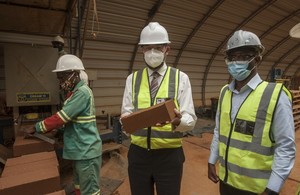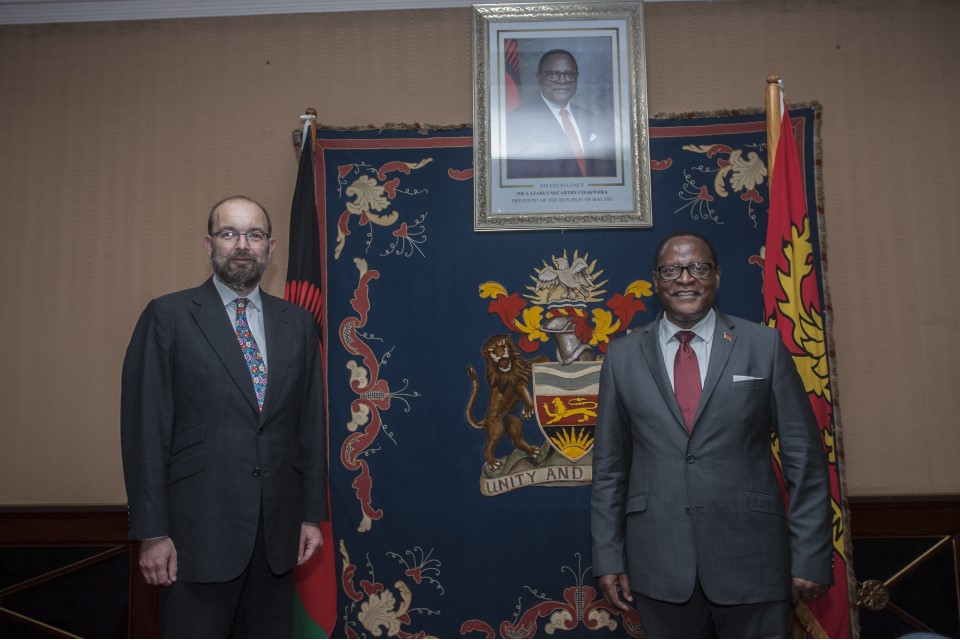Minister for Africa announces closer UK-Southern Africa partnerships on visit to Malawi and Zambia
James Duddridge's visit shows how Foreign, Commonwealth & Development Office brings together development and diplomacy to act as a force for good in the world.

James Duddridge, UK Minister for Africa, pictured during his visit to Malawi.
The UK Minister for Africa, James Duddridge, travelled to Malawi and Zambia this week (5 to 9 October) where he built on UK partnerships across Southern Africa to promote, support and reinforce our shared national interests – with a focus on boosting regional trade links and tackling the health and economic impacts of COVID-19.
He visited businesses in the 2 countries – including Zazu, a British-backed financial services start-up in Lusaka and 14Trees, a CDC investment in Lilongwe producing environmentally sustainable bricks.
In Zambia, the Minister announced UK funding to help small-and-medium-sized (SME) firms to access investment, innovate and improve productivity. This support will help create 50,000 jobs and facilitate over £100m of private sector investment into high-potential Zambian businesses.

James Duddridge meeting His Excellency Lazarus Chakwera, President of Malawi.
In Malawi, a major focus of discussions with the President, Vice President and Finance Minister was how to drive growth through improving the investment climate and reforming state-owned enterprises, building on the foundations of the UK-Africa Investment Summit in January.
He also met with the Zambian Minister for Finance and trade bodies to discuss a new UK-backed partnership between the Government of Zambia and Trademark East Africa (TMEA). The support will help improve trade flows at one of Southern Africa’s busiest borders – the Nakonde border post between Zambia and Tanzania, through which 135,000 trucks pass every year.
Informal cross-border trade accounts for up to 30 to 40% of regional trade across Southern Africa, making it a vital source of income and food security for communities across the region. But with many borders closed to help fight the COVID-19 pandemic, traders are missing out on crucial earnings their families rely on.
To ensure key border posts in Zambia, South Africa and Malawi can remain open during the COVID-19 pandemic, the Minister announced that the UK is partnering with the UN International Organization for Migration (IOM) to provide advice and training to traders, governments and border agencies – allowing traders to resume their business legally and safely.
James Duddridge, Minister for Africa said:
From farmers selling their crops at regional markets, to growing African businesses exporting to global markets, traders across Southern African are an important and growing driver of regional business, investment and prosperity.
UK support to help both formal and informal traders to move their goods quickly and safely will help Southern African trade to not just survive the economic consequences of COVID-19 but thrive in the future.
In both Malawi and Zambia, Minister Duddridge heard about the countries’ responses to the global COVID-19 pandemic and announced:
- new UK aid support for the Malawi Ministry of Health’s COVID-19 plan, to procure more supplies, deploy more front-line nurses and increase oxygen supplies for those seriously affected
- UK-backed technical assistance to design and deliver a new emergency power solution for the Levy Mwanawasa Hospital in Lusaka, enabling the hospital to provide up to 800 more beds for critical COVID-19 care
On a visit to 260 Brands/SEBA Foods – a Zambian food SME that has received UK support to invest in expanding their capacity to produce nutritious foods for the domestic market – the Minister announced UK funding to tackle childhood malnutrition in Zambia.
During the Minister’s visit to Malawi, he also met with President Lazarus Chakwera and discussed additional UK support for the new President’s commitment to fighting corruption. This will strengthen Malawi’s anti-corruption environment and increase penalties for serious and organised corruption, building on existing UK support which recently helped retrieve MK782 million (around £806,000) in assets and convict 17 criminals of corruption.
As the UK assumes the COP26 Presidency Minister Duddridge welcomed Malawi and Zambia’s international climate engagement, and reaffirmed the UK’s commitment to bringing expertise, influence and ambition to our climate action partnerships across Africa ahead of COP26 in November 2021.
Background
The Private Enterprise Programme Zambia 2
The Private Enterprise Programme Zambia 2 (PEPZ2) will strengthen Zambia’s reputation as a finance and investment hub for the region.
It will be supported by UK funding of up to £55 million over the coming years that will work to:
- support Zambian businesses in crucial sectors with finance and technical assistance to support innovation, growth, and inclusive job creation
- create and sustain over 50,000 jobs
- establish Zambia as a hub of investment in the region, supporting the creation of new investment vehicles, and promoting linkages between businesses and investors to leverage over £100m of private finance.
International Organization of Migration
The UK will provide £1 million funding to implement a programme with the International Organization for Migration (IOM) to support informal traders in Malawi, South Africa and Zambia – who rely on trading across the borders around Southern Africa for their livelihoods and income – to trade safely during the COVID-19 pandemic.
TradeMark East Africa
The UK will provide £500,000 support to boost Zambia’s regional trade links during the COVID-19 pandemic, through backing for a new partnership between the Government of Zambia and Trademark East Africa (TMEA). TMEA’s activity at Nakonde will build on existing work the UK is supporting at Zambia’s Chriundu border post with Zimbabwe.
The Tackling Serious and Organised Corruption (TSOC) Programme
The UK has committed an additional £10.8 million to the Tackling Serious and Organised Corruption (TSOC) Programme to reduce the opportunity for corrupt activity by strengthening the systems regulating how money and services move through the economy; and increase the risks of engaging in corruption, by publicly exposing corrupt individuals and corporations, seizing assets, and improving strategic casework and conviction rates.
UNICEF Malawi
Since the onset of COVID-19, UK aid provided £1.8 million for the response in Malawi. The new UK aid funding of £6 million, through UNICEF Malawi, will support the Malawi Government’s COVID-19 preparedness and response by:
- expanding surveillance to 12 additional districts (21 total)
- equipping 2 more Emergency Treatment Units (eight in total)
- deploying 40 nurses and frontline health workers in hard-hit maternal and neonatal mortality districts to protect basic services
- supporting trials of pharmaceuticals to treat ambulatory COVID-19 cases and avert hospitalisation
- scaling up use of face-coverings to reduce contagion risk in public settings
- completing a new oxygen plant at the Kamuzu Central Hospital; and procuring vital equipment (700,000 gloves, 140 oxygen concentrators, 50,000 masks, and other medical supplies) to treat 2,500 patients
- improving national awareness, reaching 2 million more people
- strengthening the Emergency Operation Centre of the Ministry of Health and supporting coordination in 12 more districts
Strengthening health resilience in Zambia
The UK is committing an extra ZMK4.1 million (£180,000) and expert technical assistance to design and deliver a new emergency power solution for the Levy Mwanawasa Hospital in Lusaka.
Tackling child malnutrition in Zambia
The UK is committing an additional £12 million of funding to the Tackling Child and Maternal Undernutrition programme in Zambia. This supports builds on UK support to scaling up nutrition efforts in Zambia since 2011.
Media enquiries
Email newsdesk@fcdo.gov.uk
Telephone 020 7008 3100
Contact the FCDO Communication Team via email (monitored 24 hours a day) in the first instance, and we will respond as soon as possible.